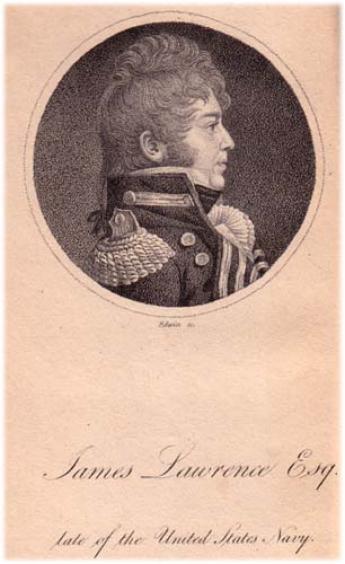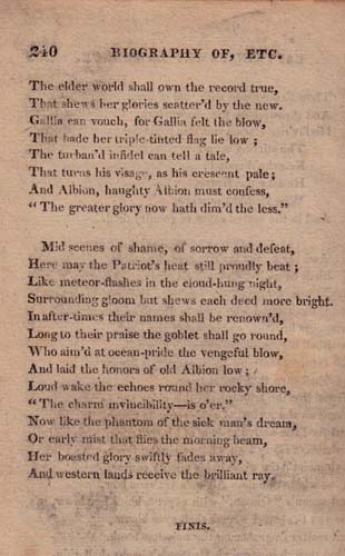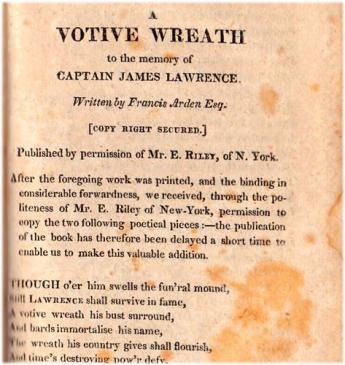Antiquarian Booksellers' Association of America Ten Pound Island Book Company
How to Identify Rare Books and First Editions - Surrender the Ship?

By Greg Gibson
I got stumped last week, trying to catalog a book I’d recently purchased. It was the first full length biography of the American naval hero James Lawrence, and it was supposed to be 244 pages long. However, my copy seemed complete at page 240, which ended with the word “finis.”
I must’ve spent an hour pouring through my reference books trying to reconcile the discrepancy.
I had a dim recollection of the pagination issue being explained to me by the gentleman from whom I’d purchased the book. But I couldn’t remember the details, and I couldn’t piece it together from the bibliographies. So I sent an email to that gentleman, my old friend and customer, Vice Admiral George Emery (see my “Bookman’s Log” entry, April 29 for a review of his excellent book In Their Own Words) who just happened to be an expert on the history of the War of 1812. I told him I needed his help recounting the story of the Lawrence book, that I was stuck, and about to Give Up the Ship.
Then I went for a walk.
For those of you who have the misfortune (at least during these two marvelous weeks) of not living in New England, I must tell you that the lilacs are in full bloom. And the apple trees. And the impossibly delicate lady slippers, ranging in hue from the deepest purple to pure white.
When you go for a walk in the middle of May in New England, you walk through air redolent with the fragrance of lilacs and apple blossoms. The sun is warm upon your cheek, and the breeze has a playful, innocent quality. Unless, of course, it’s sleeting.
Upon my return I opened George Emery’s email, and there was my answer.
According to a note printed on page 241, the book was already in publication when the last four pages of memorial poems arrived. Publication was halted and the last four pages were bound in. So, this 240 page copy of the scarce biography was, in all probability, even scarcer than its 244 page cousin.
Until the 1950s authorship of the book was attributed to that multi-talented genius Anon. Then a noted American bibliographer named Jacob Blank discovered that the Biography of James Lawrence, esq. had first appeared in the Analectic Magazine, published in Philadelphia, in August, 1813. The editor of the journal at that time was Washington Irving, and Mr. Blank worked out that Irving had written Biography of James Lawrence, esq., - the first book to paint Lawrence as a fallen hero.
This rather obscure bibliographical point came into play yesterday when I got an email from my friend Tom Halstead, an old state department hand and a veteran of the government’s Arms Control and Disarmament Agency. Tom was alerting me to the fact that he’d just published an article in this week’s Boston Sunday Globe called, “Don’t give up… oh, never mind.” http://www.bostonglobe.com/ideas/2013/05/18/the-real-shameful-story-behind-don-give-ship/AVYGogGB9gtXrydeyRx1BP/story.html
The article deconstructs the events behind Lawrence’s historic utterance “Don’t give up the ship!” Halstead comes to the conclusion that “not only did Lawrence’s surviving crew give up the ship almost immediately after his exhortation, but historians and military analysts would later conclude that Lawrence had disobeyed orders to avoid combat in the first place, then committed a series of tactical blunders that all but guaranteed he and his ship would lose.”
He describes the creation of the Lawrence legend as a public relations coup, carried forward with the full support of the American people who “had wanted a victory on June 1, and if they could not have a victory, at least they wanted a hero.”
It’s a fascinating business, this creation of national heroes. No sooner did Britain roll out Nelson’s “Band of Brothers” than we came along with “Preble’s Boys.” At what point, and by what means, does national pride become propaganda?
For now, we'll leave that question to men of experience and wisdom like Tom Halstead and George Emery, both of whom have spent their careers in the service of this country, and who might be expected to have differing interpretations of the facts at hand.
I’ll only add a note about the uncertainty, delicacy, and whimsicality of the process of creating national heroes and legends.
In his ur-biography Washington Irving quotes Lawrence thus: “The brave Lawrence saw the overwhelming danger; his last words, as he was borne bleeding from the deck, were, ‘don’t surrender the ship!’”
Don’t Surrender the Ship?
Halstead told me, “It’s intriguing to speculate how anyone could really know what Lawrence actually said. It could very well have been "Oh, SHIT!" which all his hagiographers felt just wouldn’t do… Consider that once the battle was over and all the American crewmen were bottled up below decks, the one thing the British wanted to do was to get their prize back to Nova Scotia. Nobody is recorded as having escaped, or allowed to go ashore in Boston to tell anyone what happened. The official reports were written from Halifax days later (with no mention of Lawrence's famous last words). All the officers and crew were prisoners, and while the officers may have had some freedom to wander around Halifax I have not found any local newspaper stories that might have told the tale of Lawrence's dying words.”
(Irving, Washington.) BIOGRAPHY OF JAMES LAWRENCE, ESQ. LATE A CAPTAIN IN THE NAVY OF THE UNITED STATES: TOGETHER WITH A COLLECTION OF THE MOST INTERESTING PAPERS, RELATIVE TO THE ACTION BETWEEN THE CHESAPEAKE AND SHANNON, AND THE DEATH OF CAPTAIN LAWRENCE, &C., &C. EMBELLISHED WITH A LIKENESS.
New Brunswick (NJ). 1813. b/w frontis. 12mo. (5), 6-240 pp. First book edition of Washington Irving’s biography of one of our early naval heroes. (Lawrence’s dying words, as quoted by Irving were, “Don’t surrender the ship!”) This is an interesting variant of a scarce naval (and Washington Irving) item. The bibliographies call for the book to have 244 pages, the final four of which are two poems by Francis Arden memorializing Lawrence. However, at the beginning of the poems there is a notice from the publisher stating that the printing and binding were well along when the Arden poems were received so the presses were stopped until the poems could be added. This is a copy that was bound and released before the poems arrived, making it even more unusual. Howes I-82 (an “aa” rating). See BAL 10101 for the Irving attribution. Bound in old calf, rebacked, with red spine label. $850
I think I'll go for a walk...
(Posted on Bookman's Log. Presented here by the author.)




